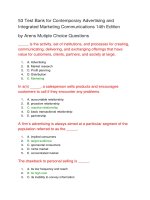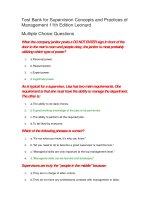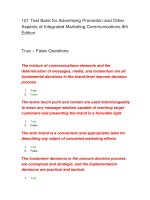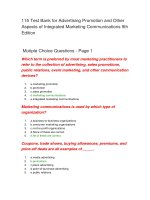Test bank of firefighter safety and health
Bạn đang xem bản rút gọn của tài liệu. Xem và tải ngay bản đầy đủ của tài liệu tại đây (152.11 KB, 9 trang )
Chapter 2: Firefighter Safety and Health
MULTIPLE CHOICE
1. In 2010 the leading causes of fire fatalities were:
A. live fire training.
B. overexertion and falls.
C. stress and overexertion.
D. overexertion and being struck by an object.
ANS: C
PTS: 1
REF: 46
OBJ: 2.I.1 List the main types of job-related firefighter fatalities, injuries, and illnesses.
NAT: NFPA® 1001, 5.1.1
TOP: Firefighter I
2. Which of the following is an injury cost carried by an individual?
A. Physical pain
B. Higher insurance payout
C. Compensation payments
D. Need to replace personnel off duty
ANS: A
PTS: 1
REF: 48
OBJ: 2.I.1 List the main types of job-related firefighter fatalities, injuries, and illnesses.
NAT: NFPA® 1001, 5.1.1
TOP: Firefighter I
3. Which of the following statements BEST describes the difference between acute and chronic
illness?
A. Acute is more serious than chronic.
B. Acute is short term, chronic is long lasting.
C. Acute is more painful, chronic is less invasive.
D. Acute requires a doctor visit, chronic may not.
ANS: B
PTS: 1
REF: 49
OBJ: 2.I.1 List the main types of job-related firefighter fatalities, injuries, and illnesses.
NAT: NFPA® 1001, 5.1.1
TOP: Firefighter I
4. Which of the following contributes to the common types of respiratory diseases for which
firefighters are at risk?
A. Heat stress
B. Psychological stress
C. Exposure to smoke and chemicals
D. Exposure to long, irregular work hours
ANS: C
PTS: 1
REF: 50
OBJ: 2.I.1 List the main types of job-related firefighter fatalities, injuries, and illnesses.
NAT: NFPA® 1001, 5.1.1
TOP: Firefighter I
5. Which of the following is one way firefighters can reduce exposure to carcinogens present in
fires?
A. Clean helmet liners
B. Follow good nutritional guidelines
C. Maintain positive mental attitudes
D. Maintain high levels of physical fitness
ANS: A
PTS: 1
REF: 51
OBJ: 2.I.1 List the main types of job-related firefighter fatalities, injuries, and illnesses.
NAT: NFPA® 1001, 5.1.1
TOP: Firefighter I
6. Which of the following illnesses can result in headaches, nausea, and weakness in legs?
A. Obesity
B. Alcohol abuse
C. Cardiovascular disease
D. Stress-induced hypertension
ANS: D
PTS: 1
REF: 52
OBJ: 2.I.1 List the main types of job-related firefighter fatalities, injuries, and illnesses.
NAT: NFPA® 1001, 5.1.1
TOP: Firefighter I
7. Which of the following NFPA® standards establishes the design criteria for protective
clothing and equipment?
A. 1403
B. 1582
C. 1851
D. 1977
ANS: D
PTS: 1
REF: 55
OBJ: 2.I.2 Describe the National Fire Protection Association® standards related to firefighter safety
and health.
NAT: NFPA® 1001, 5.1.1
TOP: Firefighter I
8. Which NFPA® standard defines safe training practices and programs?
A. 1403
B. 1582
C. 1851
D. 1977
ANS: A
PTS: 1
REF: 55
OBJ: 2.I.2 Describe the National Fire Protection Association® standards related to firefighter safety
and health.
NAT: NFPA® 1001, 5.1.1
TOP: Firefighter I
9. Which NFPA® standard sets requirements for care and maintenance of personal and
respiratory protection equipment?
A. 1403
B. 1582
C. 1851
D. 1977
ANS: C
PTS: 1
REF: 55
OBJ: 2.I.2 Describe the National Fire Protection Association® standards related to firefighter safety
and health.
NAT: NFPA® 1001, 5.1.1
TOP: Firefighter I
10. Which NFPA® standard specifies the minimum requirements for department safety and health
programs?
A. 1407
B. 1500
C. 1851
D. 1977
ANS: B
PTS: 1
REF: 56
OBJ: 2.I.2 Describe the National Fire Protection Association® standards related to firefighter safety
and health.
NAT: NFPA® 1001, 5.1.1
TOP: Firefighter I
11. Which of the following must a fire department’s safety and health program address?
A. All anticipated hazards to which members may be exposed
B. All hazards to which members have been exposed in the past
C. Some anticipated hazards to which members may be exposed
D. Some hazards which members have been exposed to in the past
ANS: A
PTS: 1
REF: 56
OBJ: 2.I.2 Describe the National Fire Protection Association® standards related to firefighter safety
and health.
NAT: NFPA® 1001, 5.1.1
TOP: Firefighter I
12. Which of the following is a minimum requirement for protective clothing and equipment as
established by NFPA® 1500?
A. New recruits may not need to train with PPE.
B. Most personnel should be fully equipped with PPE.
C. Protective equipment must meet current NFPA® design standard.
D. Protective equipment must meet one of the two most current NFPA® design
standards.
ANS: C
PTS: 1
REF: 57
OBJ: 2.I.2 Describe the National Fire Protection Association® standards related to firefighter safety
and health.
NAT: NFPA® 1001, 5.1.1
TOP: Firefighter I
13. According to NFPA® 1500 emergency operations are limited to:
A. those that are required to save the most lives.
B. those that can be safely conducted by personnel on scene.
C. those that can be started as soon as any personnel reach the scene.
D. those that can be started as soon as the lives of all on scene are safe.
ANS: B
PTS: 1
REF: 57
OBJ: 2.I.2 Describe the National Fire Protection Association® standards related to firefighter safety
and health.
NAT: NFPA® 1001, 5.1.1
TOP: Firefighter I
14. NFPA® 1500 requires that departments develop ___, including an annual medical verification
of duty fitness.
A. physical performance standards for all personnel
B. physical performance standards for new personnel
C. physical performance standards for personnel participating in administrative
positions
D. physical performance standards for personnel participating in emergency
operations
ANS: D
PTS: 1
REF: 59
OBJ: 2.I.2 Describe the National Fire Protection Association® standards related to firefighter safety
and health.
NAT: NFPA® 1001, 5.1.1
TOP: Firefighter I
15. Occupational Safety and Health Administration (OSHA) regulations only apply to federal
employees unless:
A.
B.
C.
D.
local jurisdiction exempts the adoption of certain regulations.
federal jurisdiction exempts the adoption of certain regulations.
a federal jurisdiction decides not to adopt part of the regulations.
a state jurisdiction decides to adopt them as part of local regulations.
ANS: D
PTS: 1
REF: 60
OBJ: 2.I.3 Identify Occupational Safety and Health Administration (OSHA) regulations and how
they relate to firefighters.
NAT: NFPA® 1001, 5.1.1
TOP: Firefighter I
16. The goal of the National Fallen Firefighters Foundation is to reduce fatalities by twenty-five
percent within five years and by ___ in ten years.
A. 10%
B. 15%
C. 30%
D. 50%
ANS: D
PTS: 1
REF: 61
OBJ: 2.I.3 Identify Occupational Safety and Health Administration (OSHA) regulations and how
they relate to firefighters.
NAT: NFPA® 1001, 5.1.1
TOP: Firefighter I
17. What is the goal of the International Association of Fire Chiefs annual safety stand-down?
A. To focus on firefighters
B. To focus on firefighter safety
C. To focus on firefighter families
D. To focus on firefighter fatalities
ANS: B
PTS: 1
REF: 62
OBJ: 2.I.3 Identify Occupational Safety and Health Administration (OSHA) regulations and how
they relate to firefighters.
NAT: NFPA® 1001, 5.1.1
TOP: Firefighter I
18. The risk management model assumes that responders will risk their lives ___ to save savable
lives.
A. a lot
B. a little
C. not at all
D. sometimes
ANS: A
PTS: 1
REF: 62
OBJ: 2.I.4 Summarize the model that supports the concept of risk management.
NAT: NFPA® 1001, 5.1.1
TOP: Firefighter I
19. The concept of risk management is based on an assessment of benefits gained compared to the
___:
A. risks involved.
B. safety-first mindset.
C. loss of life expected.
D. risk to equipment on scene.
ANS: A
PTS: 1
REF: 62
OBJ: 2.I.4 Summarize the model that supports the concept of risk management.
NAT: NFPA® 1001, 5.1.1
TOP: Firefighter I
20. Which of the following is a goal of fire department safety and health programs?
A. Prevent fires in jurisdiction
B. Prevent high insurance premiums
C. Prevent damage to emergency response equipment
D. Prevent damage to environment during emergency incidents
ANS: C
PTS: 1
REF: 63
OBJ: 2.I.5 Describe fire department safety and health programs. | 2.I.6 Summarize firefighter health
awareness issues.
NAT: NFPA® 1001, 5.1.1
TOP: Firefighter I
21. Which of the following groups does an Employee Assistance Program offer assistance to?
A. Firefighters
B. Firefighters and their families
C. Only firefighters with marital problems
D. Only firefighters with drug abuse problems
ANS: B
PTS: 1
REF: 65
OBJ: 2.I.5 Describe fire department safety and health programs. | 2.I.6 Summarize firefighter health
awareness issues.
NAT: NFPA® 1001, 5.1.1
TOP: Firefighter I
22. Which of the following BEST describes the causes of apparatus collisions a driver/operator is
not responsible for?
A. Excessive apparatus speed
B. Reckless driving by the public
C. Improper backing of apparatus
D. Lack of apparatus driving experience
ANS: B
PTS: 1
REF: 66
OBJ: 2.I.7 Summarize safe vehicle operations.
NAT: NFPA® 1001, 5.3.2 | NFPA® 1001, 5.3.3
TOP: Firefighter I
23. The unique characteristics of a fire apparatus can:
A. make it easier to handle.
B. make it more difficult to handle.
C. require driver/operators to drive faster than with other vehicles.
D. require driver/operators to drive the same as with other vehicles.
ANS: B
PTS: 1
REF: 68
OBJ: 2.I.7 Summarize safe vehicle operations.
NAT: NFPA® 1001, 5.3.2 | NFPA® 1001, 5.3.3
TOP: Firefighter I
24. When driving a fire apparatus, driver/operators should remember safe driving begins:
A. before leaving the station.
B. when encountering a problem on-scene.
C. as soon as a problem occurs while driving.
D. when encountering the public when driving to and from the scene.
ANS: A
PTS: 1
REF: 69
OBJ: 2.I.7 Summarize safe vehicle operations.
NAT: NFPA® 1001, 5.3.2 | NFPA® 1001, 5.3.3
TOP: Firefighter I
25. The distance the apparatus travels from when the driver/operator realizes the need to stop,
until the driver/operator’s foot touches the brake pedal is:
A. a very brief time.
B. called braking distance.
C. called driver-reaction distance.
D. a longer time than in a private vehicle.
ANS: C
PTS: 1
REF: 70
OBJ: 2.I.7 Summarize safe vehicle operations.
NAT: NFPA® 1001, 5.3.2 | NFPA® 1001, 5.3.3
TOP: Firefighter I
26. Which of the following is the only exception to the rule: never stand on or in moving
apparatus?
A. There is no exception to this rule
B. When the emergency situation requires a firefighter to stand on a moving
apparatus
C. When loading hose and apparatus is moving forward at 5 mph [8 km/h] or less
D. When loading hose and apparatus is moving forward at 10 mph [16 Km/h] or more
ANS: C
PTS: 1
REF: 72
OBJ: 2.I.8 Summarize guidelines for riding safely on the apparatus.
NAT: NFPA® 1001, 5.3.2
TOP: Firefighter I
27. Which of the following is a common safety measure taken when riding on a fire apparatus?
A. Wear helmet, regardless of cab type
B. Secure all loose tools and equipment
C. Wear hearing protection only after arriving on-scene
D. Be seated and secure belt while apparatus starts moving
ANS: B
PTS: 1
REF: 72
OBJ: 2.I.8 Summarize guidelines for riding safely on the apparatus.
NAT: NFPA® 1001, 5.3.2
TOP: Firefighter I
28. Which of the following is the BEST description of the main cause of injuries suffered in fire
stations and facilities?
A. Safe behavior
B. Poor nutrition
C. Unsafe behavior
D. Lack of driving skill
ANS: C
PTS: 1
REF: 73
OBJ: 2.I.9 Describe ways to help prevent accidents and injuries in fire stations and facilities.
NAT: NFPA® 1001, 5.1.1
TOP: Firefighter I
29. Which of the following commonly causes slips, trips, and falls in the fire station?
A. Cluttered surfaces
B. Cooking equipment
C. Lifting heavy objects
D. Toxic cleaning chemicals
ANS: A
PTS: 1
REF: 74
OBJ: 2.I.9 Describe ways to help prevent accidents and injuries in fire stations and facilities.
NAT: NFPA® 1001, 5.1.1
TOP: Firefighter I
30. Which of the following BEST describes ways to prevent back and leg strains?
A. Lift with straight back and use legs
B. Lift with shoulders and use legs only for balance
C. Lift in an area with plenty of space for maneuvering
D. Lift in an area with others around in case assistance is needed
ANS: A
PTS: 1
REF: 74
OBJ: 2.I.9 Describe ways to help prevent accidents and injuries in fire stations and facilities.
NAT: NFPA® 1001, 5.1.1
TOP: Firefighter I
31. Firefighters should ___ and put all tools in a ready state before storing.
A. inspect, clean,
B. modify, clean,
C. modify as needed
D. inspect as needed
ANS: A
PTS: 1
REF: 76
OBJ: 2.I.10 Explain general guidelines for tool and equipment safety.
NAT: NFPA® 1001, 5.3.4
TOP: Firefighter I
32. Any power tool not marked double insulated should:
A. have a two-prong plug.
B. have a three-prong plug.
C. not ever be used outside.
D. not ever be used with an extension cord.
ANS: B
PTS: 1
REF: 76
OBJ: 2.I.10 Explain general guidelines for tool and equipment safety.
NAT: NFPA® 1001, 5.3.4
TOP: Firefighter I
33. Which of the following is a way to prevent accidents with power saws?
A. Use whatever saw is most convenient
B. Refuel gasoline-powered saws immediately
C. Store blades and cutting chains separately
D. Keep blades and cutting chains well sharpened
ANS: D
PTS: 1
REF: 76
OBJ: 2.I.10 Explain general guidelines for tool and equipment safety.
NAT: NFPA® 1001, 5.3.4
TOP: Firefighter I
34. Which of the following is the BEST way to exhibit safe behavior during training?
A. Remain focused on training exercise at all times.
B. Remain focused on training exercise when it seems important.
C. Be alert for opportunities to play jokes to increase crew morale.
D. Be alert for ways the training is not what your jurisdiction does exactly and point
all those issues out.
ANS: A
PTS: 1
REF: 78
OBJ: 2.I.11 Describe ways to maintain safety in training.
TOP: Firefighter I
NAT: NFPA® 1001, 5.1.1
35. Live fire training must be conducted according to the requirements of which NFPA®
standard?
A. 1000
B. 1403
C. 1500
D. 1582
ANS: B
PTS: 1
REF: 78
OBJ: 2.I.11 Describe ways to maintain safety in training.
TOP: Firefighter I
NAT: NFPA® 1001, 5.1.1
36. Which of the following types of equipment may wear out more quickly?
A. Medical equipment
B. Respiratory equipment
C. Equipment used for training
D. Equipment used for emergency calls
ANS: C
PTS: 1
REF: 78
OBJ: 2.I.11 Describe ways to maintain safety in training.
TOP: Firefighter I
NAT: NFPA® 1001, 5.1.1
37. Which of the following BEST summarizes a benefit of the National Incident Management
System (NIMS)?
A. Allows multiple organizations to operate together at high rise incidents
B. Allows multiple organizations to operate together at haz mat incidents
C. Provides consistent funding for agencies from multiple jurisdictions when
operating together
D. Provides consistent framework for agencies from multiple jurisdictions to operate
together
ANS: D
PTS: 1
REF: 79
OBJ: 2.I.12 State the practices a Firefighter I uses for emergency scene preparedness and safety.
NAT: NFPA® 1001, 5.1.1 | NFPA® 1001, 5.3.3
TOP: Firefighter I
38. When operating at an emergency scene, why should a firefighter scan the outside of a building
before entry?
A. To assess structural design
B. To assess if entry is possible
C. To locate anyone trapped inside
D. To locate possible escape routes
ANS: D
PTS: 1
REF: 80
OBJ: 2.I.12 State the practices a Firefighter I uses for emergency scene preparedness and safety.
NAT: NFPA® 1001, 5.1.1 | NFPA® 1001, 5.3.3
TOP: Firefighter I
39. When operating at a roadside incident, ensure that floodlights are deployed to direct light
down on the scene without:
A. blinding passing motorists.
B. blocking warning signs from view.
C. using too much power from generators.
D. allowing passing motorists to see the scene.
ANS: A
PTS: 1
REF: 80
OBJ: 2.I.12 State the practices a Firefighter I uses for emergency scene preparedness and safety.
NAT: NFPA® 1001, 5.1.1 | NFPA® 1001, 5.3.3
TOP: Firefighter I
40. Which of the following BEST describes all the factors taken into account when establishing
on-scene control zones?
A. Hazard present, weather conditions
B. Hazard present, amount of people present
C. Work area needed, time of day, weather conditions
D. Work area needed, hazard present, weather conditions
ANS: D
PTS: 1
REF: 83
OBJ: 2.I.13 Summarize general guidelines for scene management including highway incidents,
crowd control, and cordoning off emergency scenes.
NAT: NFPA® 1001, 5.1.1 | NFPA® 1001, 5.3.3
TOP: Firefighter I
41. The area that must be kept clear in case a piece of a structure collapses during an incident is
called the:
A. cold zone.
B. control zone.
C. collapse zone.
D. crowd control zone.
ANS: C
PTS: 1
REF: 84
OBJ: 2.I.13 Summarize general guidelines for scene management including highway incidents,
crowd control, and cordoning off emergency scenes.
NAT: NFPA® 1001, 5.1.1 | NFPA® 1001, 5.3.3
TOP: Firefighter I
42. Which of the following is the BEST description of personnel accountability systems?
A. Systems that assist in keeping track of personnel’s expenses
B. Systems that assist in keeping track of firefighters in the fire station
C. Systems that assist in keeping track of personnel’s use of equipment
D. Systems that assist in keeping track of firefighters at an emergency scene
ANS: D
PTS: 1
REF: 85
OBJ: 2.I.14 Explain the importance of personnel accountability.
NAT: NFPA® 1001, 5.3.5
TOP: Firefighter I
43. Which personnel accountability system uses an Accountability Officer to track expected exit
times based on the pressure of the team’s lowest SCBA reading?
A. Passport system
B. SCBA tag system
C. Control board system
D. Electronic accountability system
ANS: B
PTS: 1
REF: 86
OBJ: 2.I.14 Explain the importance of personnel accountability.
NAT: NFPA® 1001, 5.3.5
TOP: Firefighter I









